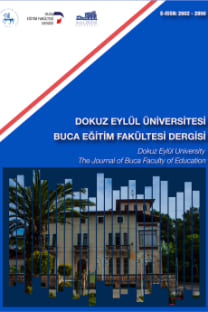İngilizce İlgi Tümcelerinde Belirlilik Derecesini Belirleyen İyelik Ekinin Önemi
Bu çalışmanın amacı ilgi tümcelerine verilen belirtilik derecesine alternatif bir açıklama getirmektir. Genellikle ilgi tümcelerinin zorluk derecesini ve buna bağlı olarak yabancı dili İngilizce olarak öğrenen öğrencilerdeki öğrenme sırasını tayin etmede etken olan ögenin, bağıntılı zamirin ilgi tümcesindeki görevi olarak gösterilmiştir. Ancak, iyelik eki tümcesinin, belirtilen iddialar doğrultusunda oluşturulan "Ad Öbekleri Erişim Sıralaması"dan (NPAH) ayrıldığı gözlemlenmiştir. Bu çalışma, iyelik eki tümcesinin bu sıralamanın dışında tutulmasını, kendi içinde ayrı bir sıralaması olduğunu göstermeyi hedeflemektedir. Elde edilen sonuçlar, Jones (2003) tarafından önerilen Ad Öbekleri Erişimlik Sıralaması ile karşılaşırılmıştır. Bu sıralamanın sadece bağıntılı zamirin ilgi türncesi içindeki görevinden değil, aynı zamanda bu zamirin iyelik gösterip göstermediği ile ilgili olduğu tespit edilmiştir.
Anahtar Kelimeler:
İlgi Tümceleri, Erişim Sıralaması, Zorluk Derecesi
The Importance of Genitive in Assigning Markedness Degrees to English Relative Clauses
The aim of this study is to seek alternative or complementary explanations for the markedness degrees assigned to relative clauses. The basic factor has usually been the function of the relative pronoun within the relative clause that determines the difficulty level of the relative clause construction, which in turn has been claimed to define the acquisition order for these clause types. The genitive in the accessibility hierarchy for noun clauses has been highlighted as one of the structures that deviates from the so far accepted Noun Phrase Accessibility Hierarchy. Thus, this study claims that genitive should be kept apart from this hierarchy as it has a nature of its own. The findings are compared to the suggested hierarchy by Jones (cited in Ellis 2003), and the results indicate that the difficulty level for relative clauses is not only determined by the function of the headnoun, but also by the genitive nature of the headnoun.
Keywords:
Relative Clauses, Accessibility Hierarchy, Difficulty Level,
- Yayın Aralığı: Yılda 4 Sayı
- Başlangıç: 1992
- Yayıncı: Dokuz Eylül Üniversitesi
Sayıdaki Diğer Makaleler
Osman Zeki Ün gör Ve Türk Müzik Eğitimine Katkıları
Programlı Öğrenme Ve Hipermetin
İngilizce İlgi Tümcelerinde Belirlilik Derecesini Belirleyen İyelik Ekinin Önemi
İlköğretim 5.6.7. Sınıf Öğrencilerinin Müzik Dersine İlişkin Tutumlarının İncelenmesi
Ergenlerde Riskli Araba Kullanma Davranışını Yordayan Psiko-Sosyal Değişkenlerin Değerlendirilmesi
Anadilin İngilizce'deki /O/ Sesinin Telefuzu Üzerindeki Etkisi
Fene Yönelik Sorgulayıcı Öğrenme Becerileri Algısı Ölçeği'nin Geliştirilmesi
Ali Günay BALIM, Sabriye Nihan TAŞKOYAN
Ebeveyn Kabul- Red Teorisi Ve Bireyin Gelişimi Açısından Önemi
Fen Öğretiminde Çoklu Zeka Kuramı Ve Zihin Haritalarının Kullanımı
